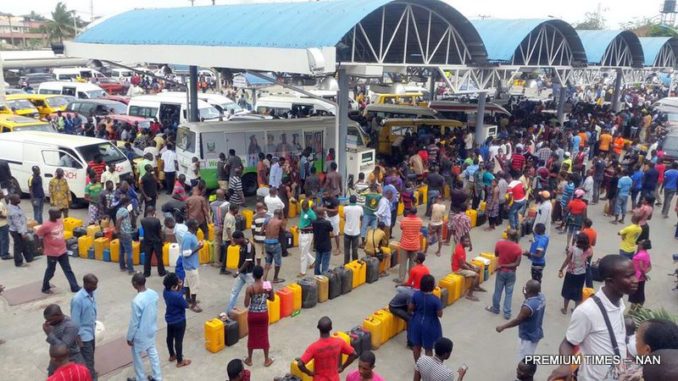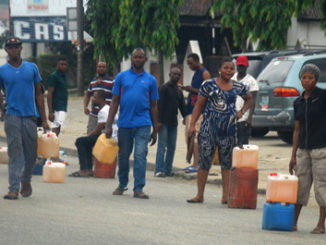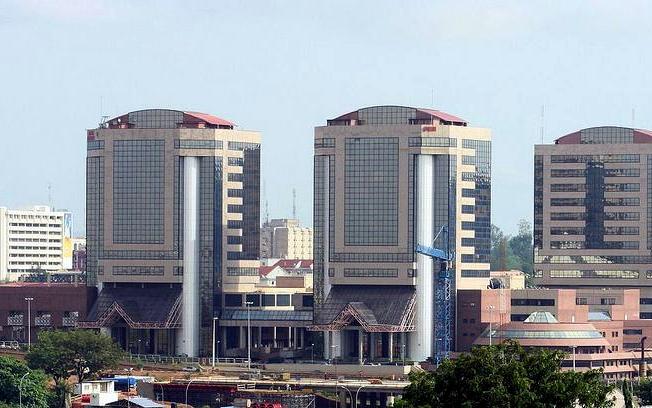
The desire of Nigerians in many cities to buy petrol at N145 per litre may not materialise anytime soon, an investigation has shown.
Findings by an undercover PREMIUM TIMES reporter, who posed as a potential oil marketer at several Lagos fuel depots, also revealed that the lingering fuel scarcity may continue into the New Year.
Oil depots are where large quantities of petroleum products are stored for onward lifting and distribution by marketers to consumers.
Many of the depots, managed by major oil marketers, did not sell fuel at the time of visit as they claimed they had no stock.
Others who had the product sold at wholesale prices far above the N133 quoted by the Nigerian National Petroleum Corporation.
NNPC, Oil marketers disagreement
NNPC’s boss, Maikanti Baru, stirred controversy last week when he revealed that the landing cost of petrol had risen to N171 a litre, meaning the government had been subsiding petrol to sell at the approved N145.
Mr. Baru said on Friday President Muhammadu Buhari authorised the corporation to subsidise the product for Nigerians.
The NNPC, he said, currently sells to marketers at N133 and expects them to sell to Nigerians at N145. The NNPC boss also blamed the oil marketers for the fuel scarcity, accusing them of “hoarding” and “diverting” the product to frustrate Nigerians.
Oil marketers deny responsibility for the scarcity, attributing the crisis to the emergence of the NNPC as the sole importer of fuel. The disagreement has continued to drag for weeks and has worsened the petrol crisis.
Most filling stations selling fuel across the country do so at prices far higher than NNPC-authorised price of N145.
In response, the Department of Petroleum Resources has closed many stations for selling above the approved price. In some states, the department has dispensed fuel free to motorists as punishment againt errant marketers.
But marketers of petroleum products have argued that the N145 price is not realistic as they buy fuel far higher than N133 from the depots.
“The fault is not with us, it at the points where we load products; as I am talking to you I bought the products I am selling now at N235 and the content was short of 1,800 litres after it was discharged and I have paid,” Cletus Obiokafor, who is the chairman of oil marketers in Anambra State, said last week.
“As Chairman of marketers in Anambra, I cannot lie to you; anybody who tells you we are buying products at normal price and selling at N250 is not truthful.”
Mr. Obiokafor warned that if the clampdown on their members continued, marketers would close filling stations, as they were no longer prepared to incur the losses.
“The Federal Government knows what to do to solve the problem; we are not responsible for it,” he said.
A PREMIUM TIMES’ investigation revealed that the marketers’ claim may not be far from the reality.
High wholesale prices
At Kirikiri-Waterside end of the depots, Swift Oil and Tecno Oil depots sold fuel at the rate of N151 per litre (against approved N133) in the morning. By afternoon, the price had risen to N152 per litre, excluding other charges by the local National Union of Petroleum and Natural Gas Workers, NUPENG.
“That’s why it is hypocritical to expect us (marketers) to sell at N145 per litre,” a furious marketer who identified himself simply as Bash, told PREMIUM TIMES.
This newspaper also found that the local NUPENG charged marketers extra fees, separate from the lifting price of N152.
The amount varies with the quantity of product to be lifted. For petrol, there are tanks for 15,000 litres, 45,000 litres and 60,000 litres.
For the 45,000 litres, N9, 000 is paid as ‘Union Fee’ while a separate N15, 000 is paid for ‘Clearance’.
“Before you can get your tanker inside here (the depot), you have to ‘settle’the Navy, the police and others,” Bash explained to our correspondent further.
“Now, is it not callous for government to be deceiving the people by expecting us to sell at N145?” he added.
Bovas Oil depot, located behind the Swift and Tecno Oil depot, sold its own product through third parties on Friday, PREMIUM TIMES gathered.
Mercy Port Oil and Fresh Oil, the two oil marketers that sold for BOVAS, told our reporter that the product was sold at N154 per litre Friday morning. By noon on Friday, when PREMIUM TIMES revisited the depot, officials said the product had been exhausted.
At the Coconut end of Apapa, the situation was worse as many of the depots were under lock. Others like Ibeto Oil, T-Time and Eternal Oil only sold diesel to marketers and tanker drivers.
At MRS Oil depot, officials said petrol sold at N163 per litre Friday morning. Sahara Energy, one of the biggest major marketers, also did not sell product to retail marketers.
One marketer who asked for anonymity wondered why the government, through the DPR, was clamping down on filling stations and not depots.
“Now as a potential marketer (referring to PREMIUM TIMES reporter), you have seen it yourself. How can a marketer buy at these prices and sell at N145? Is he stupid? That’s even if you see the product, anyway.”
In Lagos, the few filling stations that had petrol on Friday, sold at prices between N200 and N250 per litre. In Sango, Ogun state, many stations remained shut.
Speaking in Abuja on Friday, the NNPC GMD, Mr. Baru, said the government had tackled the fuel crisis, adding that Nigerians would soon be relieved in the next few days.
But many of the marketers at the depots visited in Lagos who could not get the product said there may be no final solution in sight yet to the lingering crisis.
NNPC reacts
When contacted on the telephone Saturday morning, Ndu Ughamadu, NNPC spokesperson, said the corporation had identified the issues and may wield the big stick on some marketers.
“As you are aware, the corporation is the sole importer of petroleum product into the country. The NNPC has three responsibilities: as a commercial entity; as importer of last resort; and as a social supplier. Social in the sense that it is expected of us to supply the nation with products whenever there are elements of shortages.
“We import these products and we made it clear to these depots that we are giving them at ex-officio price and they must comply with that directive. And that was precisely what caused the last fuel shortages because independent marketers in Lagos alleged that these depots were charging them exorbitant prices which we intervened and we called them to order.
“When they were selling to them at exorbitant prices, they threatened and asked Nigerians to start stockpiling products and many of the independent marketers started hoarding products. As a result, there was panic buying which led to hoarding and diversion.”
Mr. Nghamadu said the NNPC is expected to meet with marketers within two days. He said the corporation plans to draw their attention to all the issues and also read out the riot act.
“That’s why I said we are going to tackle all these. They are not supposed to do that because we are just coming out of these shortage of fuel challenge. We are going to challenge it and we are going to send our officials, particularly PPMC, to the area,” he said.
When confronted with PREMIUM TIMES’ findings that show that there may be no lasting solution to the crisis soon and the scarcity may drag into the New Year, the NNPC spokesperson debunked the claim.
“No. No, no, no, no…. We have enough product. It is the system right now because we have tackled this issue of hoarding but diversion is what nobody can guarantee because it is beyond us,” he said.
“Equally, we have secured the assurances of security agencies and even the president directed about two days ago to monitor the borders. We equally held meetings with tanker drivers and NATO, their employers on the issue of diversion and the issue of hoarding. So it will be tackled and it will not step into the New Year.
“We will wade into it because in spite of the debt they are owing us, we have been supplying products to all these depots. We will wade into it.”
END







Be the first to comment